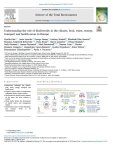Kim H.J., Lazurko A., Linney G., Maskell L., Díaz-General E., Brezovská R.J., Keune H., Laspidou C., Malinen H., Oinonen S., Raymond J., Rounsevell M., Vano S., Venâncio M.D., Viesca-Ramirez A., Wijesekera A., Wilson K., Ziliaskopoulos K., Harrison P.A. (2024). Understanding the role of biodiversity in the climate, food, water, energy, transport and health nexus in Europe. Science of the Total Environment, 15/05/2024, vol. 925, p. 171692.
https://doi.org/10.1016/j.scitotenv.2024.171692
https://doi.org/10.1016/j.scitotenv.2024.171692
| Titre : | Understanding the role of biodiversity in the climate, food, water, energy, transport and health nexus in Europe (2024) |
| Auteurs : | H.J. Kim ; A. Lazurko ; G. Linney ; L. Maskell ; E. Díaz-General ; R.J. Brezovská ; H. Keune ; C. Laspidou ; H. Malinen ; S. Oinonen ; J. Raymond ; M. Rounsevell ; S. Vano ; M.D. Venâncio ; A. Viesca-Ramirez ; A. Wijesekera ; K. Wilson ; K. Ziliaskopoulos ; P.A. Harrison |
| Type de document : | Article |
| Dans : | Science of the Total Environment (vol. 925, May 2024) |
| Article en page(s) : | p. 171692 |
| Langues : | Anglais |
| Langues du résumé : | Anglais |
| Catégories : |
Catégories principales 07 - ENVIRONNEMENT ; 7.4 - Ressources Naturelles : Paysage, Biodiversité, Patrimoine naturelThésaurus IAMM BIODIVERSITE ; CLIMAT ; ALIMENTATION HUMAINE ; EAU ; ENERGIE ; TRANSPORT ; SANTE ; POLITIQUE ; EUROPE |
| Résumé : | Biodiversity underpins the functioning of ecosystems and the diverse benefits that nature provides to people, yet is being lost at an unprecedented rate. To halt or reverse biodiversity loss, it is critical to understand the complex interdependencies between biodiversity and key drivers and sectors to inform the development of holistic policies and actions. We conducted a literature review on the interlinkages between biodiversity and climate change, food, water, energy, transport and health (?the biodiversity nexus?). Evidence extracted from 194 peer-reviewed articles was analysed to assess how biodiversity is being influenced by and is influencing the other nexus elements. Out of the 354 interlinkages between biodiversity and the other nexus elements, 53 % were negative, 29 % were positive and 18 % contained both positive and negative influences. The majority of studies provide evidence of the negative influence of other nexus elements on biodiversity, highlighting the substantial damage being inflicted on nature from human activities. The main types of negative impacts were land or water use/change, land or water degradation, climate change, and direct species fatalities through collisions with infrastructure. Alternatively, evidence of biodiversity having a negative influence on the other nexus elements was limited to the effects of invasive alien species and vector-borne diseases. Furthermore, a range of studies provided evidence of how biodiversity and the other nexus elements can have positive influences on each other through practices that promote co-benefits. These included biodiversity-friendly management in relevant sectors, protection and restoration of ecosystems and species that provide essential ecosystem services, green and blue infrastructure including nature-based solutions, and sustainable and healthy diets that mitigate climate change. The review highlighted the complexity and context-dependency of interlinkages within the biodiversity nexus, but clearly demonstrates the importance of biodiversity in underpinning resilient ecosystems and human well-being in ensuring a sustainable future for people and the planet. |
| Cote : | En ligne |
| URL / DOI : | https://doi.org/10.1016/j.scitotenv.2024.171692 |







